Mental Illness: A Significant Cause of Homelessness and Its Effects
VerifiedAdded on 2022/09/12
|10
|2814
|25
Essay
AI Summary
This essay explores the complex relationship between mental illness and homelessness, arguing that mental health disorders significantly contribute to the issue. It discusses how mental illness disrupts an individual's ability to care for themselves, maintain relationships, and interpret guidance, leading to a higher rate of homelessness. The essay references studies highlighting the prevalence of mental illness among the homeless population, as well as the two-way relationship between homelessness and illness. It examines the impact of factors such as poverty, substance abuse, trauma, social isolation, and lack of low-income housing. The essay also emphasizes the role of community-based services and supportive housing in mitigating homelessness among those with mental illnesses. The conclusion underscores the interconnectedness of mental illness and homelessness, suggesting that both conditions can exacerbate each other, highlighting the importance of addressing both issues simultaneously to alleviate human suffering.
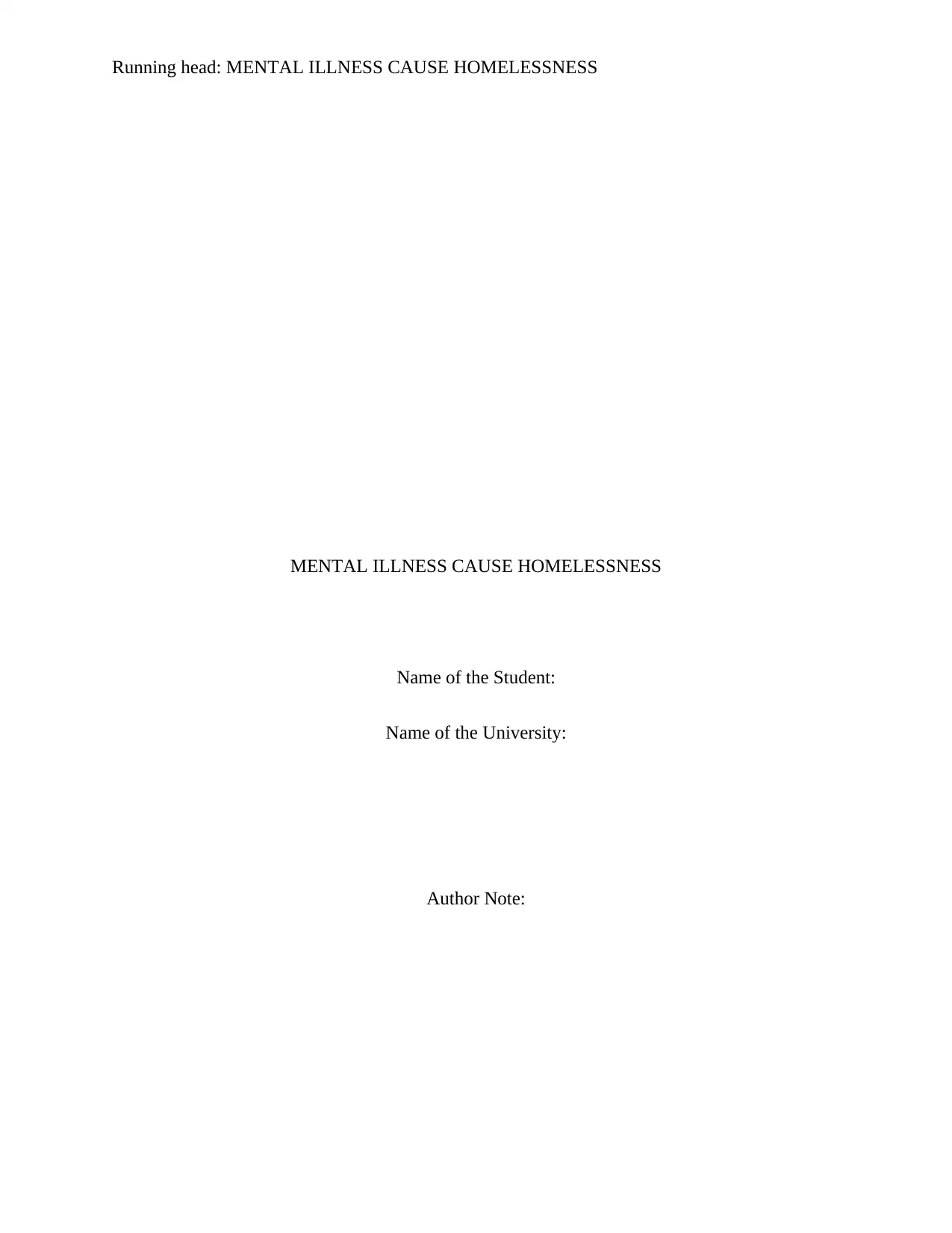
Running head: MENTAL ILLNESS CAUSE HOMELESSNESS
MENTAL ILLNESS CAUSE HOMELESSNESS
Name of the Student:
Name of the University:
Author Note:
MENTAL ILLNESS CAUSE HOMELESSNESS
Name of the Student:
Name of the University:
Author Note:
Paraphrase This Document
Need a fresh take? Get an instant paraphrase of this document with our AI Paraphraser
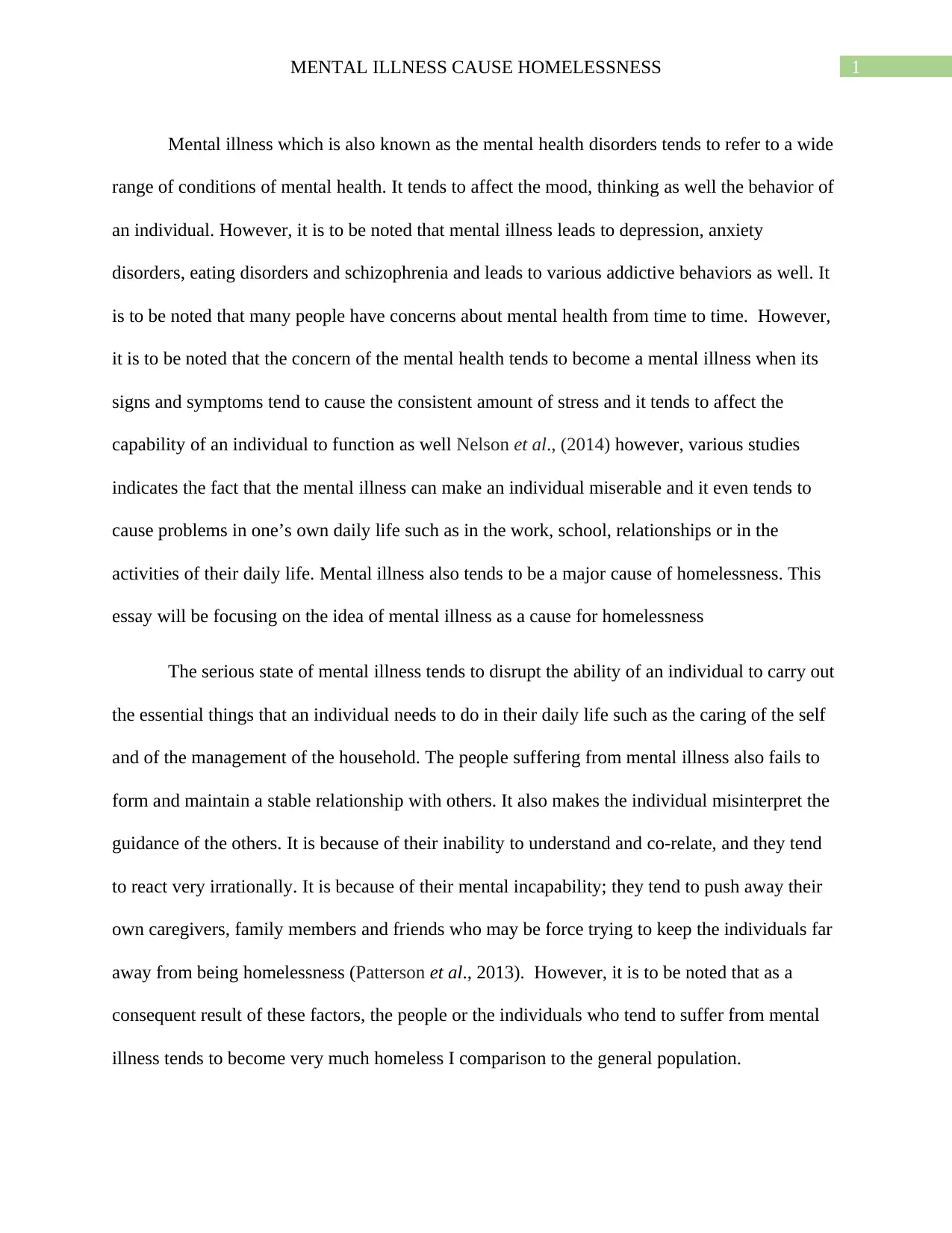
1MENTAL ILLNESS CAUSE HOMELESSNESS
Mental illness which is also known as the mental health disorders tends to refer to a wide
range of conditions of mental health. It tends to affect the mood, thinking as well the behavior of
an individual. However, it is to be noted that mental illness leads to depression, anxiety
disorders, eating disorders and schizophrenia and leads to various addictive behaviors as well. It
is to be noted that many people have concerns about mental health from time to time. However,
it is to be noted that the concern of the mental health tends to become a mental illness when its
signs and symptoms tend to cause the consistent amount of stress and it tends to affect the
capability of an individual to function as well Nelson et al., (2014) however, various studies
indicates the fact that the mental illness can make an individual miserable and it even tends to
cause problems in one’s own daily life such as in the work, school, relationships or in the
activities of their daily life. Mental illness also tends to be a major cause of homelessness. This
essay will be focusing on the idea of mental illness as a cause for homelessness
The serious state of mental illness tends to disrupt the ability of an individual to carry out
the essential things that an individual needs to do in their daily life such as the caring of the self
and of the management of the household. The people suffering from mental illness also fails to
form and maintain a stable relationship with others. It also makes the individual misinterpret the
guidance of the others. It is because of their inability to understand and co-relate, and they tend
to react very irrationally. It is because of their mental incapability; they tend to push away their
own caregivers, family members and friends who may be force trying to keep the individuals far
away from being homelessness (Patterson et al., 2013). However, it is to be noted that as a
consequent result of these factors, the people or the individuals who tend to suffer from mental
illness tends to become very much homeless I comparison to the general population.
Mental illness which is also known as the mental health disorders tends to refer to a wide
range of conditions of mental health. It tends to affect the mood, thinking as well the behavior of
an individual. However, it is to be noted that mental illness leads to depression, anxiety
disorders, eating disorders and schizophrenia and leads to various addictive behaviors as well. It
is to be noted that many people have concerns about mental health from time to time. However,
it is to be noted that the concern of the mental health tends to become a mental illness when its
signs and symptoms tend to cause the consistent amount of stress and it tends to affect the
capability of an individual to function as well Nelson et al., (2014) however, various studies
indicates the fact that the mental illness can make an individual miserable and it even tends to
cause problems in one’s own daily life such as in the work, school, relationships or in the
activities of their daily life. Mental illness also tends to be a major cause of homelessness. This
essay will be focusing on the idea of mental illness as a cause for homelessness
The serious state of mental illness tends to disrupt the ability of an individual to carry out
the essential things that an individual needs to do in their daily life such as the caring of the self
and of the management of the household. The people suffering from mental illness also fails to
form and maintain a stable relationship with others. It also makes the individual misinterpret the
guidance of the others. It is because of their inability to understand and co-relate, and they tend
to react very irrationally. It is because of their mental incapability; they tend to push away their
own caregivers, family members and friends who may be force trying to keep the individuals far
away from being homelessness (Patterson et al., 2013). However, it is to be noted that as a
consequent result of these factors, the people or the individuals who tend to suffer from mental
illness tends to become very much homeless I comparison to the general population.
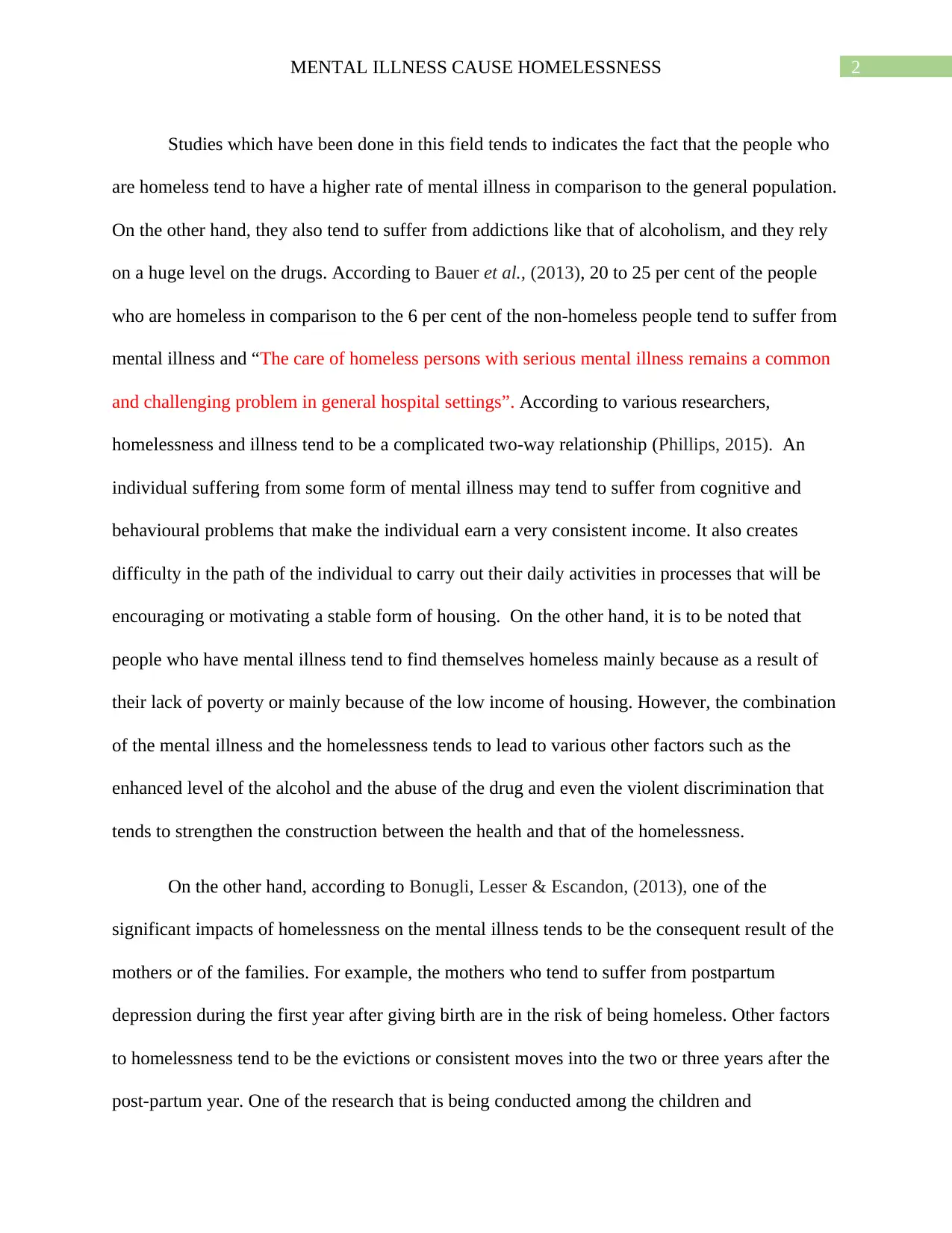
2MENTAL ILLNESS CAUSE HOMELESSNESS
Studies which have been done in this field tends to indicates the fact that the people who
are homeless tend to have a higher rate of mental illness in comparison to the general population.
On the other hand, they also tend to suffer from addictions like that of alcoholism, and they rely
on a huge level on the drugs. According to Bauer et al., (2013), 20 to 25 per cent of the people
who are homeless in comparison to the 6 per cent of the non-homeless people tend to suffer from
mental illness and “The care of homeless persons with serious mental illness remains a common
and challenging problem in general hospital settings”. According to various researchers,
homelessness and illness tend to be a complicated two-way relationship (Phillips, 2015). An
individual suffering from some form of mental illness may tend to suffer from cognitive and
behavioural problems that make the individual earn a very consistent income. It also creates
difficulty in the path of the individual to carry out their daily activities in processes that will be
encouraging or motivating a stable form of housing. On the other hand, it is to be noted that
people who have mental illness tend to find themselves homeless mainly because as a result of
their lack of poverty or mainly because of the low income of housing. However, the combination
of the mental illness and the homelessness tends to lead to various other factors such as the
enhanced level of the alcohol and the abuse of the drug and even the violent discrimination that
tends to strengthen the construction between the health and that of the homelessness.
On the other hand, according to Bonugli, Lesser & Escandon, (2013), one of the
significant impacts of homelessness on the mental illness tends to be the consequent result of the
mothers or of the families. For example, the mothers who tend to suffer from postpartum
depression during the first year after giving birth are in the risk of being homeless. Other factors
to homelessness tend to be the evictions or consistent moves into the two or three years after the
post-partum year. One of the research that is being conducted among the children and
Studies which have been done in this field tends to indicates the fact that the people who
are homeless tend to have a higher rate of mental illness in comparison to the general population.
On the other hand, they also tend to suffer from addictions like that of alcoholism, and they rely
on a huge level on the drugs. According to Bauer et al., (2013), 20 to 25 per cent of the people
who are homeless in comparison to the 6 per cent of the non-homeless people tend to suffer from
mental illness and “The care of homeless persons with serious mental illness remains a common
and challenging problem in general hospital settings”. According to various researchers,
homelessness and illness tend to be a complicated two-way relationship (Phillips, 2015). An
individual suffering from some form of mental illness may tend to suffer from cognitive and
behavioural problems that make the individual earn a very consistent income. It also creates
difficulty in the path of the individual to carry out their daily activities in processes that will be
encouraging or motivating a stable form of housing. On the other hand, it is to be noted that
people who have mental illness tend to find themselves homeless mainly because as a result of
their lack of poverty or mainly because of the low income of housing. However, the combination
of the mental illness and the homelessness tends to lead to various other factors such as the
enhanced level of the alcohol and the abuse of the drug and even the violent discrimination that
tends to strengthen the construction between the health and that of the homelessness.
On the other hand, according to Bonugli, Lesser & Escandon, (2013), one of the
significant impacts of homelessness on the mental illness tends to be the consequent result of the
mothers or of the families. For example, the mothers who tend to suffer from postpartum
depression during the first year after giving birth are in the risk of being homeless. Other factors
to homelessness tend to be the evictions or consistent moves into the two or three years after the
post-partum year. One of the research that is being conducted among the children and
⊘ This is a preview!⊘
Do you want full access?
Subscribe today to unlock all pages.

Trusted by 1+ million students worldwide
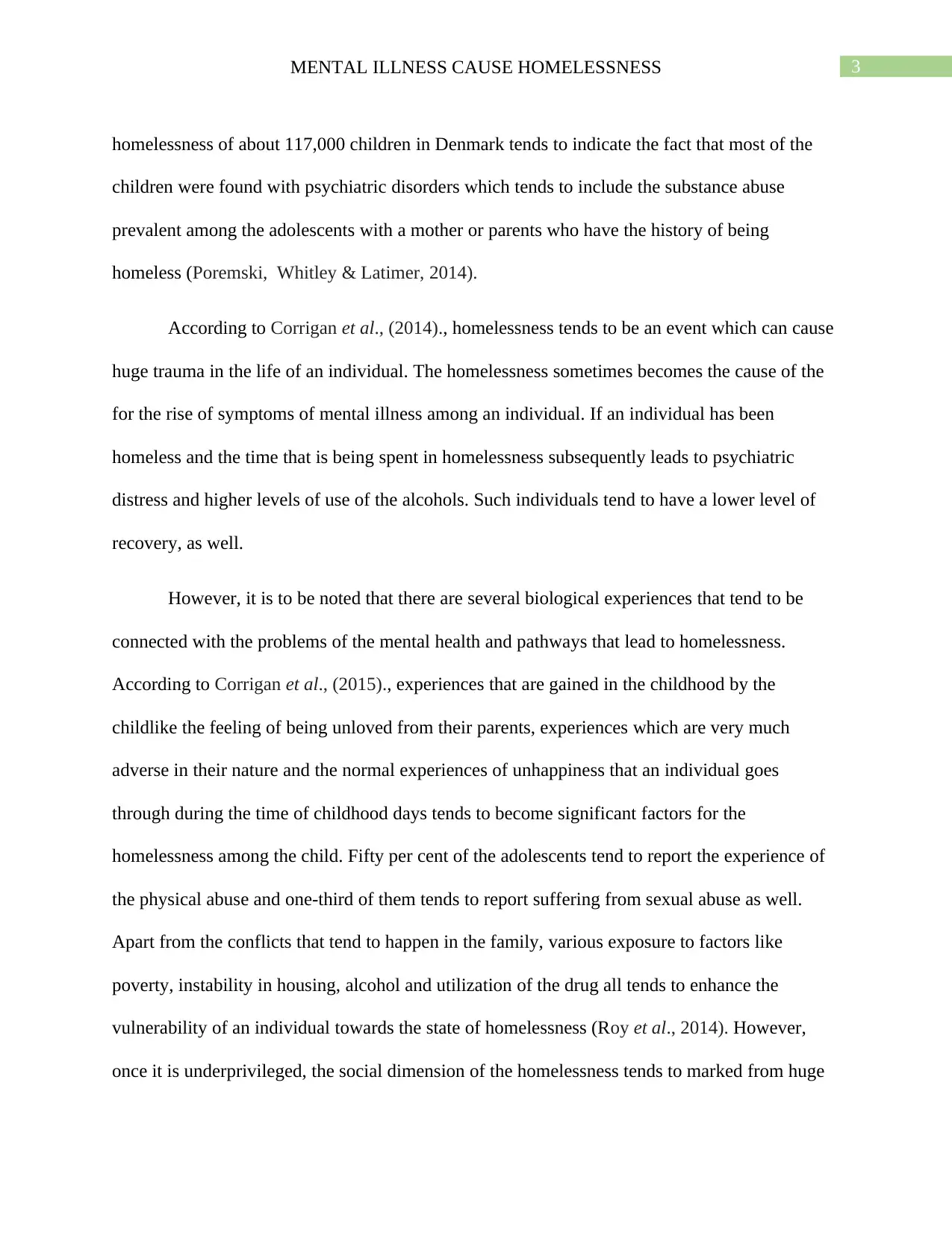
3MENTAL ILLNESS CAUSE HOMELESSNESS
homelessness of about 117,000 children in Denmark tends to indicate the fact that most of the
children were found with psychiatric disorders which tends to include the substance abuse
prevalent among the adolescents with a mother or parents who have the history of being
homeless (Poremski, Whitley & Latimer, 2014).
According to Corrigan et al., (2014)., homelessness tends to be an event which can cause
huge trauma in the life of an individual. The homelessness sometimes becomes the cause of the
for the rise of symptoms of mental illness among an individual. If an individual has been
homeless and the time that is being spent in homelessness subsequently leads to psychiatric
distress and higher levels of use of the alcohols. Such individuals tend to have a lower level of
recovery, as well.
However, it is to be noted that there are several biological experiences that tend to be
connected with the problems of the mental health and pathways that lead to homelessness.
According to Corrigan et al., (2015)., experiences that are gained in the childhood by the
childlike the feeling of being unloved from their parents, experiences which are very much
adverse in their nature and the normal experiences of unhappiness that an individual goes
through during the time of childhood days tends to become significant factors for the
homelessness among the child. Fifty per cent of the adolescents tend to report the experience of
the physical abuse and one-third of them tends to report suffering from sexual abuse as well.
Apart from the conflicts that tend to happen in the family, various exposure to factors like
poverty, instability in housing, alcohol and utilization of the drug all tends to enhance the
vulnerability of an individual towards the state of homelessness (Roy et al., 2014). However,
once it is underprivileged, the social dimension of the homelessness tends to marked from huge
homelessness of about 117,000 children in Denmark tends to indicate the fact that most of the
children were found with psychiatric disorders which tends to include the substance abuse
prevalent among the adolescents with a mother or parents who have the history of being
homeless (Poremski, Whitley & Latimer, 2014).
According to Corrigan et al., (2014)., homelessness tends to be an event which can cause
huge trauma in the life of an individual. The homelessness sometimes becomes the cause of the
for the rise of symptoms of mental illness among an individual. If an individual has been
homeless and the time that is being spent in homelessness subsequently leads to psychiatric
distress and higher levels of use of the alcohols. Such individuals tend to have a lower level of
recovery, as well.
However, it is to be noted that there are several biological experiences that tend to be
connected with the problems of the mental health and pathways that lead to homelessness.
According to Corrigan et al., (2015)., experiences that are gained in the childhood by the
childlike the feeling of being unloved from their parents, experiences which are very much
adverse in their nature and the normal experiences of unhappiness that an individual goes
through during the time of childhood days tends to become significant factors for the
homelessness among the child. Fifty per cent of the adolescents tend to report the experience of
the physical abuse and one-third of them tends to report suffering from sexual abuse as well.
Apart from the conflicts that tend to happen in the family, various exposure to factors like
poverty, instability in housing, alcohol and utilization of the drug all tends to enhance the
vulnerability of an individual towards the state of homelessness (Roy et al., 2014). However,
once it is underprivileged, the social dimension of the homelessness tends to marked from huge
Paraphrase This Document
Need a fresh take? Get an instant paraphrase of this document with our AI Paraphraser
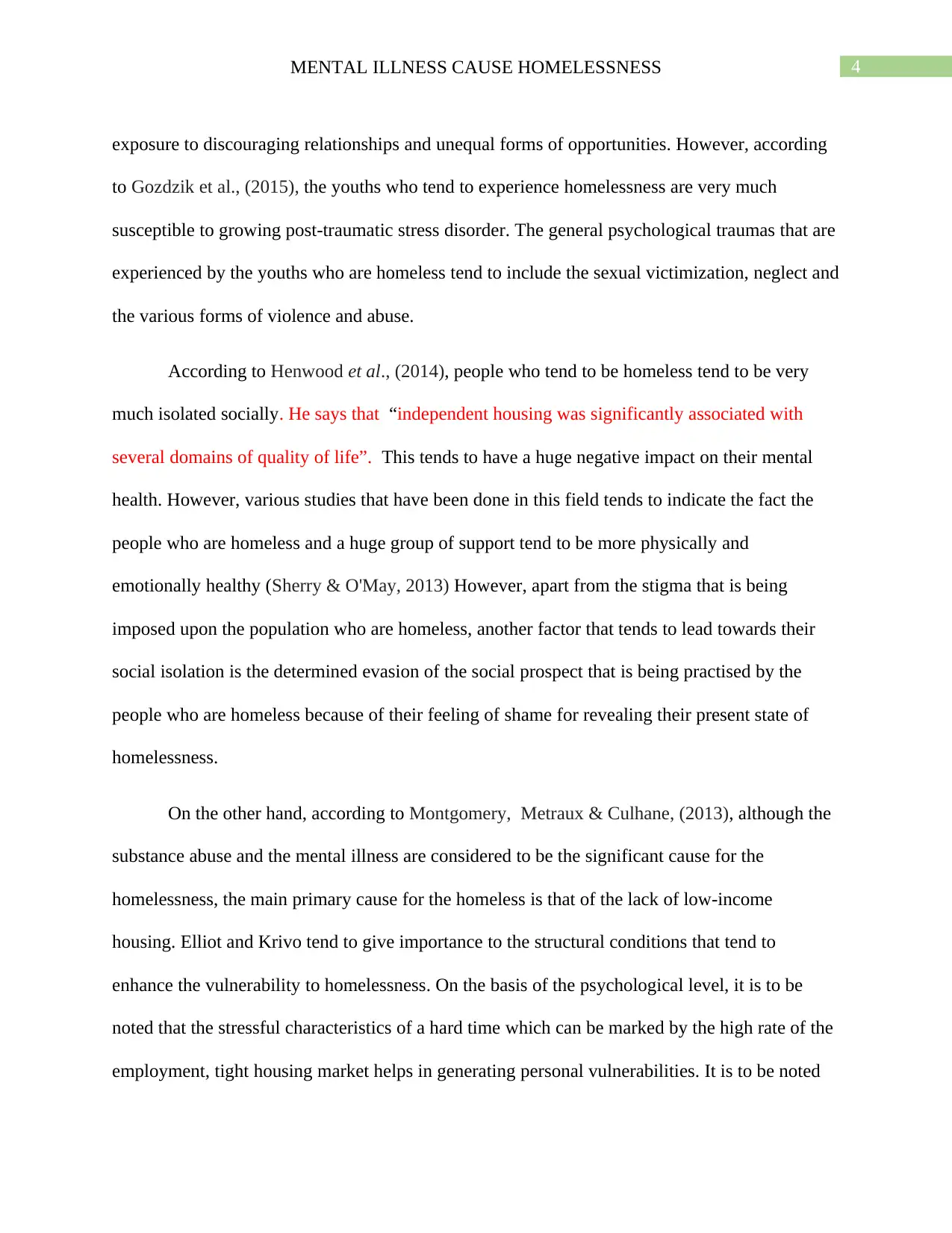
4MENTAL ILLNESS CAUSE HOMELESSNESS
exposure to discouraging relationships and unequal forms of opportunities. However, according
to Gozdzik et al., (2015), the youths who tend to experience homelessness are very much
susceptible to growing post-traumatic stress disorder. The general psychological traumas that are
experienced by the youths who are homeless tend to include the sexual victimization, neglect and
the various forms of violence and abuse.
According to Henwood et al., (2014), people who tend to be homeless tend to be very
much isolated socially. He says that “independent housing was significantly associated with
several domains of quality of life”. This tends to have a huge negative impact on their mental
health. However, various studies that have been done in this field tends to indicate the fact the
people who are homeless and a huge group of support tend to be more physically and
emotionally healthy (Sherry & O'May, 2013) However, apart from the stigma that is being
imposed upon the population who are homeless, another factor that tends to lead towards their
social isolation is the determined evasion of the social prospect that is being practised by the
people who are homeless because of their feeling of shame for revealing their present state of
homelessness.
On the other hand, according to Montgomery, Metraux & Culhane, (2013), although the
substance abuse and the mental illness are considered to be the significant cause for the
homelessness, the main primary cause for the homeless is that of the lack of low-income
housing. Elliot and Krivo tend to give importance to the structural conditions that tend to
enhance the vulnerability to homelessness. On the basis of the psychological level, it is to be
noted that the stressful characteristics of a hard time which can be marked by the high rate of the
employment, tight housing market helps in generating personal vulnerabilities. It is to be noted
exposure to discouraging relationships and unequal forms of opportunities. However, according
to Gozdzik et al., (2015), the youths who tend to experience homelessness are very much
susceptible to growing post-traumatic stress disorder. The general psychological traumas that are
experienced by the youths who are homeless tend to include the sexual victimization, neglect and
the various forms of violence and abuse.
According to Henwood et al., (2014), people who tend to be homeless tend to be very
much isolated socially. He says that “independent housing was significantly associated with
several domains of quality of life”. This tends to have a huge negative impact on their mental
health. However, various studies that have been done in this field tends to indicate the fact the
people who are homeless and a huge group of support tend to be more physically and
emotionally healthy (Sherry & O'May, 2013) However, apart from the stigma that is being
imposed upon the population who are homeless, another factor that tends to lead towards their
social isolation is the determined evasion of the social prospect that is being practised by the
people who are homeless because of their feeling of shame for revealing their present state of
homelessness.
On the other hand, according to Montgomery, Metraux & Culhane, (2013), although the
substance abuse and the mental illness are considered to be the significant cause for the
homelessness, the main primary cause for the homeless is that of the lack of low-income
housing. Elliot and Krivo tend to give importance to the structural conditions that tend to
enhance the vulnerability to homelessness. On the basis of the psychological level, it is to be
noted that the stressful characteristics of a hard time which can be marked by the high rate of the
employment, tight housing market helps in generating personal vulnerabilities. It is to be noted
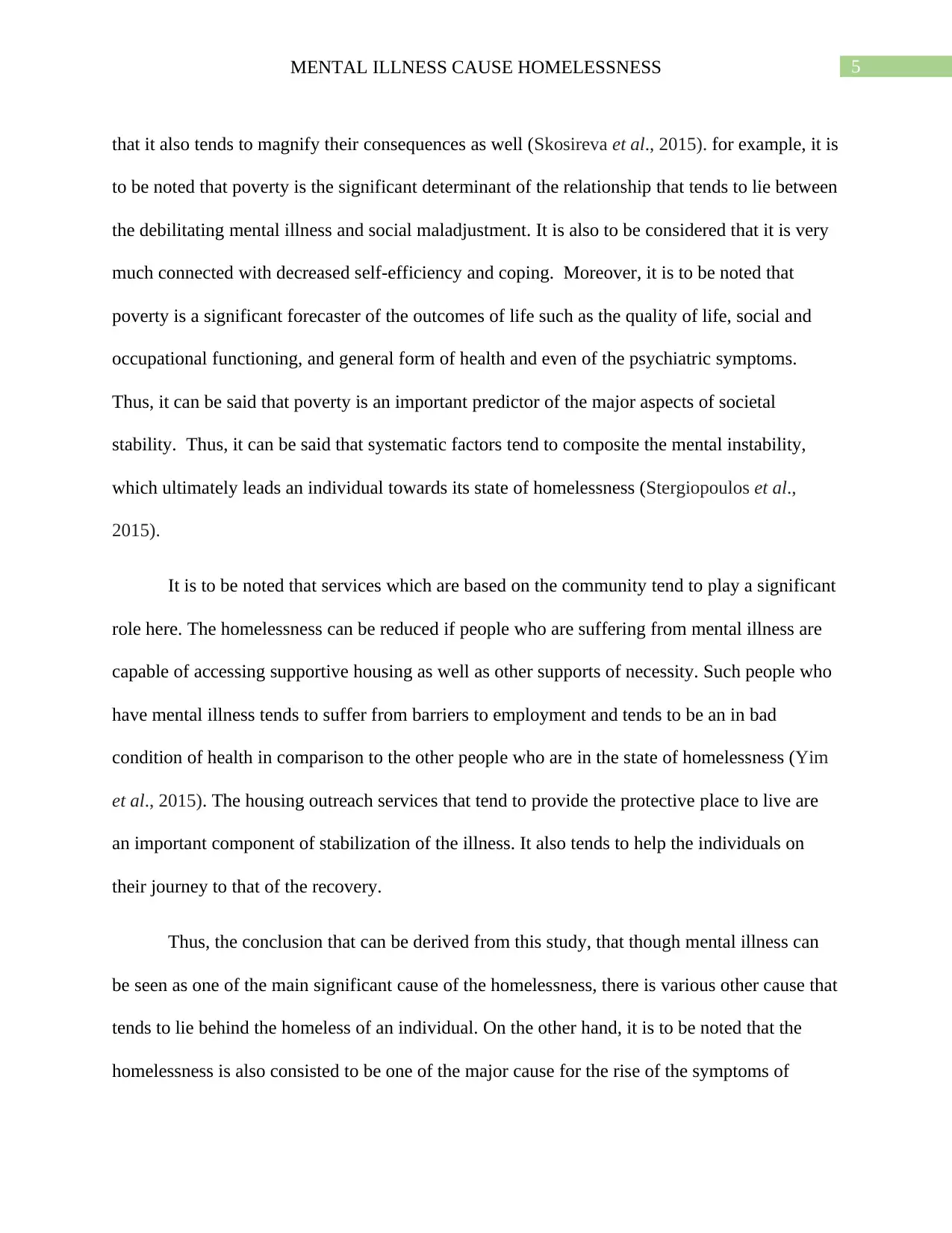
5MENTAL ILLNESS CAUSE HOMELESSNESS
that it also tends to magnify their consequences as well (Skosireva et al., 2015). for example, it is
to be noted that poverty is the significant determinant of the relationship that tends to lie between
the debilitating mental illness and social maladjustment. It is also to be considered that it is very
much connected with decreased self-efficiency and coping. Moreover, it is to be noted that
poverty is a significant forecaster of the outcomes of life such as the quality of life, social and
occupational functioning, and general form of health and even of the psychiatric symptoms.
Thus, it can be said that poverty is an important predictor of the major aspects of societal
stability. Thus, it can be said that systematic factors tend to composite the mental instability,
which ultimately leads an individual towards its state of homelessness (Stergiopoulos et al.,
2015).
It is to be noted that services which are based on the community tend to play a significant
role here. The homelessness can be reduced if people who are suffering from mental illness are
capable of accessing supportive housing as well as other supports of necessity. Such people who
have mental illness tends to suffer from barriers to employment and tends to be an in bad
condition of health in comparison to the other people who are in the state of homelessness (Yim
et al., 2015). The housing outreach services that tend to provide the protective place to live are
an important component of stabilization of the illness. It also tends to help the individuals on
their journey to that of the recovery.
Thus, the conclusion that can be derived from this study, that though mental illness can
be seen as one of the main significant cause of the homelessness, there is various other cause that
tends to lie behind the homeless of an individual. On the other hand, it is to be noted that the
homelessness is also consisted to be one of the major cause for the rise of the symptoms of
that it also tends to magnify their consequences as well (Skosireva et al., 2015). for example, it is
to be noted that poverty is the significant determinant of the relationship that tends to lie between
the debilitating mental illness and social maladjustment. It is also to be considered that it is very
much connected with decreased self-efficiency and coping. Moreover, it is to be noted that
poverty is a significant forecaster of the outcomes of life such as the quality of life, social and
occupational functioning, and general form of health and even of the psychiatric symptoms.
Thus, it can be said that poverty is an important predictor of the major aspects of societal
stability. Thus, it can be said that systematic factors tend to composite the mental instability,
which ultimately leads an individual towards its state of homelessness (Stergiopoulos et al.,
2015).
It is to be noted that services which are based on the community tend to play a significant
role here. The homelessness can be reduced if people who are suffering from mental illness are
capable of accessing supportive housing as well as other supports of necessity. Such people who
have mental illness tends to suffer from barriers to employment and tends to be an in bad
condition of health in comparison to the other people who are in the state of homelessness (Yim
et al., 2015). The housing outreach services that tend to provide the protective place to live are
an important component of stabilization of the illness. It also tends to help the individuals on
their journey to that of the recovery.
Thus, the conclusion that can be derived from this study, that though mental illness can
be seen as one of the main significant cause of the homelessness, there is various other cause that
tends to lie behind the homeless of an individual. On the other hand, it is to be noted that the
homelessness is also consisted to be one of the major cause for the rise of the symptoms of
⊘ This is a preview!⊘
Do you want full access?
Subscribe today to unlock all pages.

Trusted by 1+ million students worldwide

6MENTAL ILLNESS CAUSE HOMELESSNESS
mental illness of an individual as well. Hence, it can be concluded that both mental illness and
the state of homelessness are very much related to one another. On the one hand, it can be said
that the mental illness leads to the cause of homelessness and on the other hand, it can be said
that the homeless make an individual start having the symptoms of the mental illness. However,
both tend to cause huge sufferance in the human mind, and hence steps must be taken so that
both can be avoided.
mental illness of an individual as well. Hence, it can be concluded that both mental illness and
the state of homelessness are very much related to one another. On the one hand, it can be said
that the mental illness leads to the cause of homelessness and on the other hand, it can be said
that the homeless make an individual start having the symptoms of the mental illness. However,
both tend to cause huge sufferance in the human mind, and hence steps must be taken so that
both can be avoided.
Paraphrase This Document
Need a fresh take? Get an instant paraphrase of this document with our AI Paraphraser
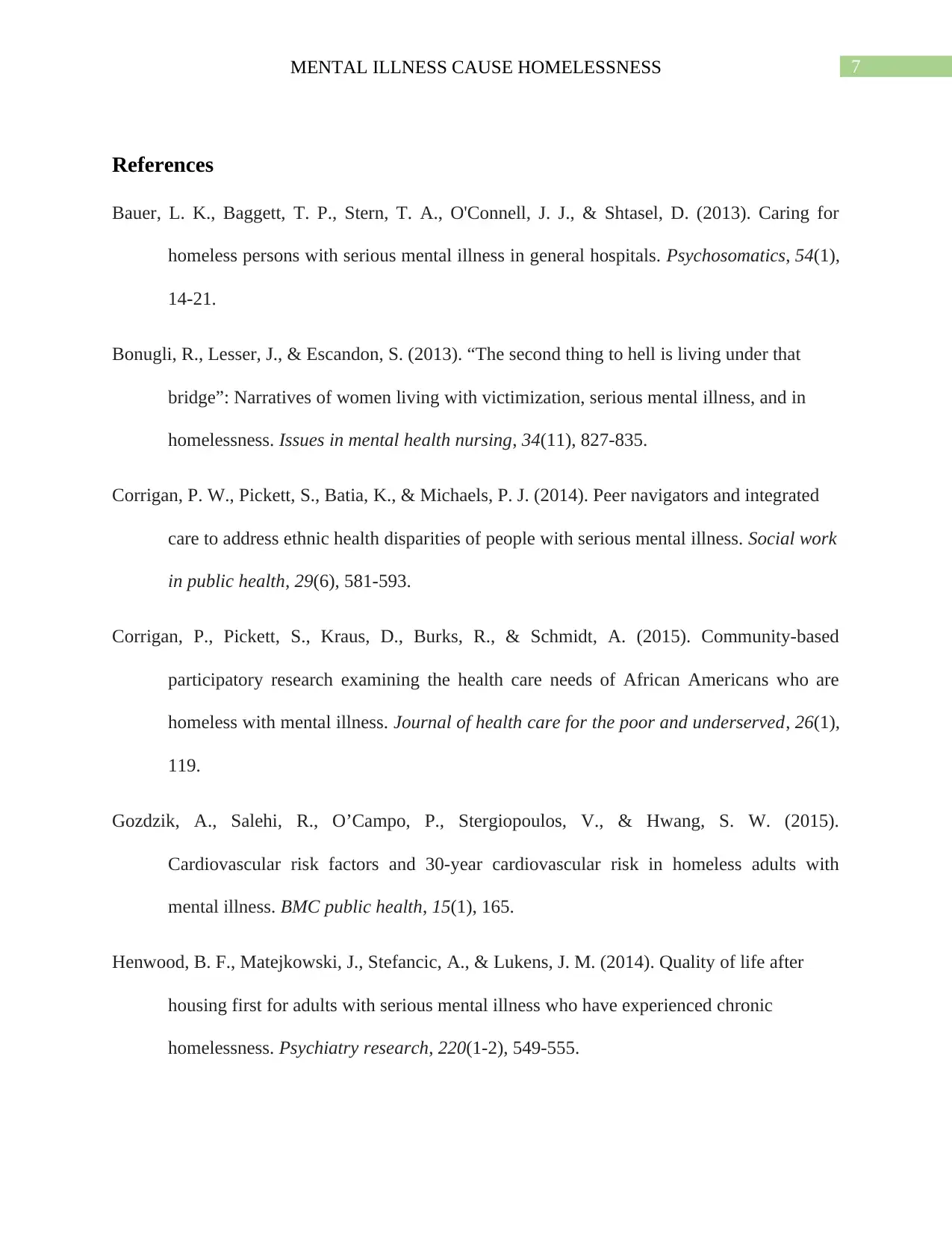
7MENTAL ILLNESS CAUSE HOMELESSNESS
References
Bauer, L. K., Baggett, T. P., Stern, T. A., O'Connell, J. J., & Shtasel, D. (2013). Caring for
homeless persons with serious mental illness in general hospitals. Psychosomatics, 54(1),
14-21.
Bonugli, R., Lesser, J., & Escandon, S. (2013). “The second thing to hell is living under that
bridge”: Narratives of women living with victimization, serious mental illness, and in
homelessness. Issues in mental health nursing, 34(11), 827-835.
Corrigan, P. W., Pickett, S., Batia, K., & Michaels, P. J. (2014). Peer navigators and integrated
care to address ethnic health disparities of people with serious mental illness. Social work
in public health, 29(6), 581-593.
Corrigan, P., Pickett, S., Kraus, D., Burks, R., & Schmidt, A. (2015). Community-based
participatory research examining the health care needs of African Americans who are
homeless with mental illness. Journal of health care for the poor and underserved, 26(1),
119.
Gozdzik, A., Salehi, R., O’Campo, P., Stergiopoulos, V., & Hwang, S. W. (2015).
Cardiovascular risk factors and 30-year cardiovascular risk in homeless adults with
mental illness. BMC public health, 15(1), 165.
Henwood, B. F., Matejkowski, J., Stefancic, A., & Lukens, J. M. (2014). Quality of life after
housing first for adults with serious mental illness who have experienced chronic
homelessness. Psychiatry research, 220(1-2), 549-555.
References
Bauer, L. K., Baggett, T. P., Stern, T. A., O'Connell, J. J., & Shtasel, D. (2013). Caring for
homeless persons with serious mental illness in general hospitals. Psychosomatics, 54(1),
14-21.
Bonugli, R., Lesser, J., & Escandon, S. (2013). “The second thing to hell is living under that
bridge”: Narratives of women living with victimization, serious mental illness, and in
homelessness. Issues in mental health nursing, 34(11), 827-835.
Corrigan, P. W., Pickett, S., Batia, K., & Michaels, P. J. (2014). Peer navigators and integrated
care to address ethnic health disparities of people with serious mental illness. Social work
in public health, 29(6), 581-593.
Corrigan, P., Pickett, S., Kraus, D., Burks, R., & Schmidt, A. (2015). Community-based
participatory research examining the health care needs of African Americans who are
homeless with mental illness. Journal of health care for the poor and underserved, 26(1),
119.
Gozdzik, A., Salehi, R., O’Campo, P., Stergiopoulos, V., & Hwang, S. W. (2015).
Cardiovascular risk factors and 30-year cardiovascular risk in homeless adults with
mental illness. BMC public health, 15(1), 165.
Henwood, B. F., Matejkowski, J., Stefancic, A., & Lukens, J. M. (2014). Quality of life after
housing first for adults with serious mental illness who have experienced chronic
homelessness. Psychiatry research, 220(1-2), 549-555.
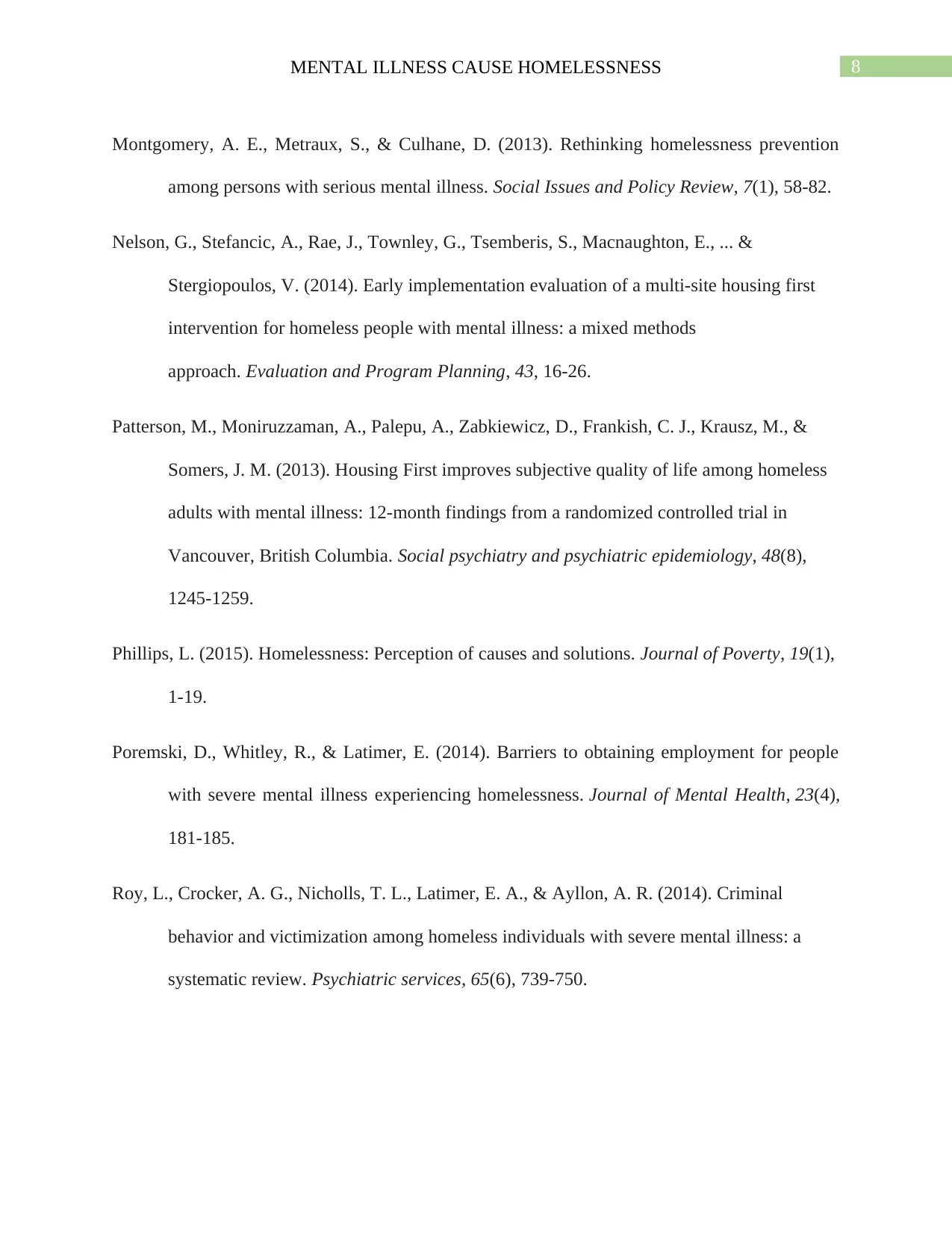
8MENTAL ILLNESS CAUSE HOMELESSNESS
Montgomery, A. E., Metraux, S., & Culhane, D. (2013). Rethinking homelessness prevention
among persons with serious mental illness. Social Issues and Policy Review, 7(1), 58-82.
Nelson, G., Stefancic, A., Rae, J., Townley, G., Tsemberis, S., Macnaughton, E., ... &
Stergiopoulos, V. (2014). Early implementation evaluation of a multi-site housing first
intervention for homeless people with mental illness: a mixed methods
approach. Evaluation and Program Planning, 43, 16-26.
Patterson, M., Moniruzzaman, A., Palepu, A., Zabkiewicz, D., Frankish, C. J., Krausz, M., &
Somers, J. M. (2013). Housing First improves subjective quality of life among homeless
adults with mental illness: 12-month findings from a randomized controlled trial in
Vancouver, British Columbia. Social psychiatry and psychiatric epidemiology, 48(8),
1245-1259.
Phillips, L. (2015). Homelessness: Perception of causes and solutions. Journal of Poverty, 19(1),
1-19.
Poremski, D., Whitley, R., & Latimer, E. (2014). Barriers to obtaining employment for people
with severe mental illness experiencing homelessness. Journal of Mental Health, 23(4),
181-185.
Roy, L., Crocker, A. G., Nicholls, T. L., Latimer, E. A., & Ayllon, A. R. (2014). Criminal
behavior and victimization among homeless individuals with severe mental illness: a
systematic review. Psychiatric services, 65(6), 739-750.
Montgomery, A. E., Metraux, S., & Culhane, D. (2013). Rethinking homelessness prevention
among persons with serious mental illness. Social Issues and Policy Review, 7(1), 58-82.
Nelson, G., Stefancic, A., Rae, J., Townley, G., Tsemberis, S., Macnaughton, E., ... &
Stergiopoulos, V. (2014). Early implementation evaluation of a multi-site housing first
intervention for homeless people with mental illness: a mixed methods
approach. Evaluation and Program Planning, 43, 16-26.
Patterson, M., Moniruzzaman, A., Palepu, A., Zabkiewicz, D., Frankish, C. J., Krausz, M., &
Somers, J. M. (2013). Housing First improves subjective quality of life among homeless
adults with mental illness: 12-month findings from a randomized controlled trial in
Vancouver, British Columbia. Social psychiatry and psychiatric epidemiology, 48(8),
1245-1259.
Phillips, L. (2015). Homelessness: Perception of causes and solutions. Journal of Poverty, 19(1),
1-19.
Poremski, D., Whitley, R., & Latimer, E. (2014). Barriers to obtaining employment for people
with severe mental illness experiencing homelessness. Journal of Mental Health, 23(4),
181-185.
Roy, L., Crocker, A. G., Nicholls, T. L., Latimer, E. A., & Ayllon, A. R. (2014). Criminal
behavior and victimization among homeless individuals with severe mental illness: a
systematic review. Psychiatric services, 65(6), 739-750.
⊘ This is a preview!⊘
Do you want full access?
Subscribe today to unlock all pages.

Trusted by 1+ million students worldwide
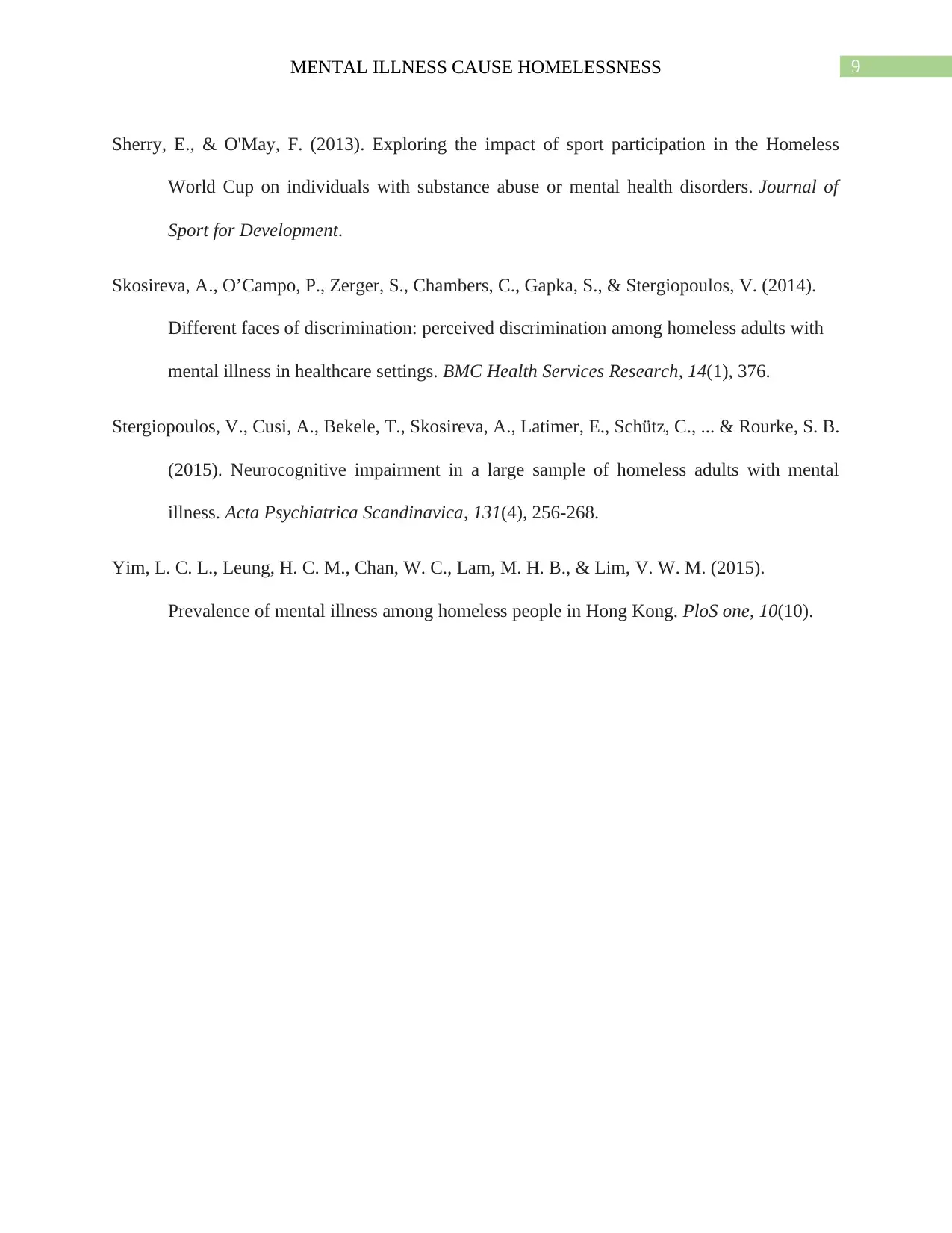
9MENTAL ILLNESS CAUSE HOMELESSNESS
Sherry, E., & O'May, F. (2013). Exploring the impact of sport participation in the Homeless
World Cup on individuals with substance abuse or mental health disorders. Journal of
Sport for Development.
Skosireva, A., O’Campo, P., Zerger, S., Chambers, C., Gapka, S., & Stergiopoulos, V. (2014).
Different faces of discrimination: perceived discrimination among homeless adults with
mental illness in healthcare settings. BMC Health Services Research, 14(1), 376.
Stergiopoulos, V., Cusi, A., Bekele, T., Skosireva, A., Latimer, E., Schütz, C., ... & Rourke, S. B.
(2015). Neurocognitive impairment in a large sample of homeless adults with mental
illness. Acta Psychiatrica Scandinavica, 131(4), 256-268.
Yim, L. C. L., Leung, H. C. M., Chan, W. C., Lam, M. H. B., & Lim, V. W. M. (2015).
Prevalence of mental illness among homeless people in Hong Kong. PloS one, 10(10).
Sherry, E., & O'May, F. (2013). Exploring the impact of sport participation in the Homeless
World Cup on individuals with substance abuse or mental health disorders. Journal of
Sport for Development.
Skosireva, A., O’Campo, P., Zerger, S., Chambers, C., Gapka, S., & Stergiopoulos, V. (2014).
Different faces of discrimination: perceived discrimination among homeless adults with
mental illness in healthcare settings. BMC Health Services Research, 14(1), 376.
Stergiopoulos, V., Cusi, A., Bekele, T., Skosireva, A., Latimer, E., Schütz, C., ... & Rourke, S. B.
(2015). Neurocognitive impairment in a large sample of homeless adults with mental
illness. Acta Psychiatrica Scandinavica, 131(4), 256-268.
Yim, L. C. L., Leung, H. C. M., Chan, W. C., Lam, M. H. B., & Lim, V. W. M. (2015).
Prevalence of mental illness among homeless people in Hong Kong. PloS one, 10(10).
1 out of 10
Related Documents
Your All-in-One AI-Powered Toolkit for Academic Success.
+13062052269
info@desklib.com
Available 24*7 on WhatsApp / Email
![[object Object]](/_next/static/media/star-bottom.7253800d.svg)
Unlock your academic potential
Copyright © 2020–2026 A2Z Services. All Rights Reserved. Developed and managed by ZUCOL.





